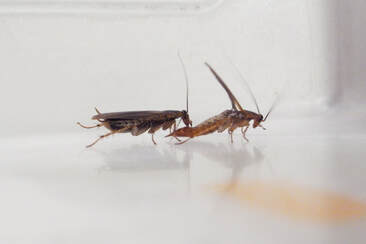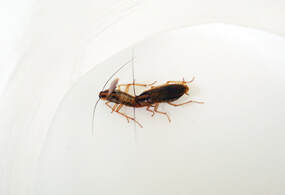|
Insecticide resistance can have troubling costs for insects. What happens when resistant insects start rejecting potential mates? Will the population revert back to susceptibility? Not necessarily. Read on to find out more about a unique, unintended consequence of behavioral insecticide resistance in a common urban pest. Previously, Bug Lessons mentioned how insecticide resistant German cockroaches started to avoid glucose (a type of sugar). Sugary, sweet baits used for managing these insects are also insecticidal. By avoiding sugar, the cockroaches ultimately also avoid the bait. Now, researchers have discovered that female cockroaches that avoid glucose (GA-females) often reject males attempting to mate. WHAT DOES SUGAR HAVE TO DO WITH COCKROACH MATING? Nuptial gifts are small “treats” that animals give to one another to help increase their chance of mating. (Think about that next time your partner gives you a box of chocolates.) This “gift-giving” practice is common in the insect world. For German cockroaches, males present females with a nuptial gift of body secretions that contain sugars and fats. This gift holds the female’s attention long enough for the males to mate.
However, the nuptial gift that males provide to females contains sugar. Researchers noticed that GA-females turn down the nuptial gift presented to them by most males. As a result, they are rejecting successful mating too. This is counter to what we would expect, since most insects must mate to survive. Why do these females reject the gift, especially since the sugars in the male nuptial gifts are not glucose? SOLVING THE PUZZLE To understand why females were leaving mating events early, researchers started matching up different pairs of cockroaches and observed what happened. Females that avoid glucose most often avoided mating with normal males. (Normal males do not avoid glucose.) However, GA-females feeding on nuptial gifts from males that also avoid glucose (GA-males) did not interrupt mating as quickly.
FINAL THOUGHTS The insecticides we use for pest management can affect both the behavior and physiology of insect populations. We need to understand exactly how we are modifying populations with insecticides because unintended consequences that make pest management more difficult can occur. According to Dr. Coby Schal, an author on the study, “We are constantly in an evolutionary battle with cockroaches. Evolution can be sped up tremendously in the urban, human environment because the selection force imposed on insects, especially inside homes, is so intense.” This study provides yet another timely reminder of the importance of science-based pest management to delay insecticide resistance and other possible unintended consequences.
0 Comments
Your comment will be posted after it is approved.
Leave a Reply. |
Bug Lessons BlogWelcome science communicators and bug nerds!
Interested in being a guest blogger?
Archives
November 2023
Categories
All
|

